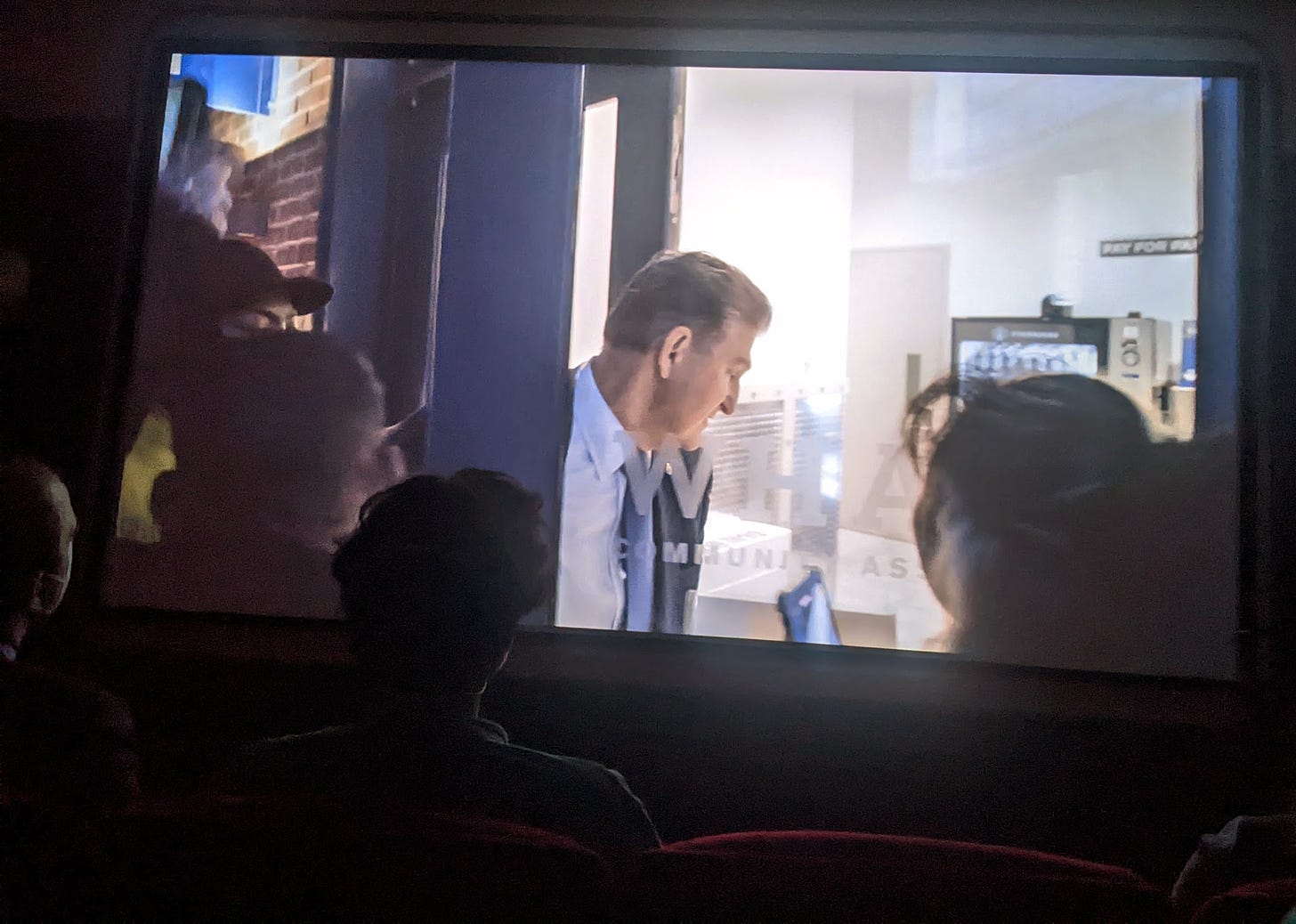PRESENTED BY THE FIRECREST
The United States Senate is a terrible institution with an absurd amount of power over the future of human civilization. Two good Senate-related things happened last night—Sen. Raphael Warnock (D-Ga.) defeated Republican challenger Herschel “Enough Trees” Walker to give the Democrats a 51-49 majority next year, and House Democrats stripped Sen. Joe Manchin’s (D-W.Va.) pipeline permitting plan from upcoming legislation after unified revolt by progressive climate hawks.
The plan by President Joe Biden, Senate Majority Leader Chuck Schumer (D-N.Y.), and House Speaker Nancy Pelosi (D-Calif.) to attach Manchin’s dirty deal to the National Defense Authorization Act collapsed last night thanks to “the hard-fought persistence and vocal opposition of environmental justice communities all across the country,” House Natural Resources chair Raúl Grijalva announced.
Climate hawk Rep. Jared Huffman (D-Calif.), who told reporter Nick Sobczyk that the Manchin plan was a “shit sandwich,” continued:
“This is a zombie that will not die. It’s going to be back again and again, I’m sure. But, to me, that just means we’ve got to keep killing it.”
Last month, the House Sustainable Energy & Environment Coalition released a policy brief outlining an alternative to Manchin’s dirty deal, with “electric transmission reform and increased community engagement in the permitting process.”
The $857.9 billion NDAA text—4,408 pages long, with a 59-page table of contents—was released last night, and will be put up for a vote as early as tomorrow. So it’s great that the Manchin deal was nixed, but boy what a terrible process that guarantees no public oversight over nearly a trillion dollars in discretionary spending for our nation’s global war machine.
Warnock’s victory marks the end of Manchin’s shadow presidency, as he will no longer be at the fulcrum of power on the Capitol. The lead in stymieing President Joe Biden’s progressive proposals will instead shift to the House, where Republicans have taken control. Unfortunately, Manchin is expected to maintain control of the Senate Committee on Energy and Natural Resources, where he will continue to work with Republicans to attack pro-climate Biden administration officials and promote fossil-fuel subsidies.
FLOODING FLOODS FLOOD: Climate denial is flooding Twitter, and climate scientists are moving to Mastodon.
For climate scientists, this breakdown has raised fears that previously mainstream online spaces like Twitter will be ceded to conspiracy theorists and others without any expertise of global heating. Kim Cobb,1 a climate scientist at Brown University, has moved to Mastodon, too, but lamented that it feels “fairly tame and pretty nerdy” compared with Twitter.
“As someone who followed lots of women scientists, and scientists of color, I’m noticing the absence of these treasured voices,” she said.
“Maybe they’ve left Twitter, or maybe they’ve fallen silent, or maybe the network has deteriorated to the point that I’m just not seeing them being retweeted by mutuals. Twitter is a shadow of its former self when it comes to climate change.”
Although the MULTIMEDIA EXPERIENCE is not my favorite kind of journalism, in “America Underwater,” a Washington Post team has put together a compelling argument in favor of the form, collaging found videos and satellite maps to relate how the Federal Emergency Management Agency’s flood maps completely fail to capture the rising risks of catastrophic fossil-fueled floods.
A Washington Post investigation uncovered communities throughout the country where FEMA’s maps are failing to warn Americans about flood risk. As climate change accelerates, it is increasing types of flooding that the maps aren’t built to include. “You would think, well, FEMA could just update the maps in issue,” W. Craig Fugate, FEMA administrator under President Barack Obama, said. “That’s not true. … Local governments have been opposed to any maps that show an increasing risk.” . . .
“It is precisely that type of flooding, urban flooding and flash flooding from shortish duration but very high-intensity downpours, that is expected to increase the most in a warming climate,” said Daniel Swain,2 a climate scientist at UCLA.
“It’s hard to argue that shipping U.S. liquefied natural gas (LNG) overseas actually benefits the American public,” Tyson Slocum writes. So why does the Biden administration keep rubber-stamping new LNG export applications?
This morning, the Department of Energy announced a new proposed rule to electrify and cut climate pollution from new or newly renovated federal buildings, with a 90% reduction in carbon pollution by 2025 and 100% by 2030.
If you’re one of those folks who thinks cars are sexy, then check this out:
The Biden White House is quietly planning to establish a national green bank to manage a $20 billion fund established by the Inflation Reduction Act, under the management of White House special assistant for climate policy and finance Jahi Wise:
A wide range of groups are calling on EPA to grant that bucket of money — $8 billion of which is required to go to low-income and disadvantaged communities — to multiple organizations that have relationships with communities on the front lines of climate change.
But one influential group, the Coalition for Green Capital (CGC), says the fund should be used to create a national green bank, which would be in charge of allocating the money. For decades, the Coalition for Green Capital has argued that a national green bank is the most effective way to ensure dollars are distributed quickly with proper oversight.
Notably, the White House announced Monday that Jahi Wise, who currently serves as a special assistant to President Joe Biden for climate policy and finance, will head the fund. Wise previously directed policy at the Coalition for Green Capital.
The Coalition for Green Capital is an alliance of major environmental organizations, government agencies, green banks, and fossil-fuel industry lawyers like Latham & Watkins and Womble Bond Dickinson, Covington & Burling, and Alston & Bird.
EPA Administrator Michael Regan on Tuesday expanded his environmental justice push to coal country with a trip to a rural, Trump-loving town in West Virginia long plagued by serious water problems.
OUT AND ABOUT: Last night, documentary filmmaker Rachel Lears (“Knock Down the House”) presented a preview screening of her new doc, “To The End,” at Eaton DC. The film portrays the efforts of Varshini Prakash, Alexandra Rojas, Alexandria Ocasio-Cortez (D-N.Y.), and Rhiana Gunn-Wright to build the movement for Green New Deal legislation. Ryan Grim moderated a panel with Lears, Lauren Maunus, Amira Hassan, and Matt Mayers. SPOTTED: Alexandra Rojas, Jeremy Liskar, Murshed Zaheed, JP Mejia, Amirah Sequeira, and some dude from POLITICO Playbook PRESENTED BY CHEVRON.
Breaking from Politico’s house style: To The End is an impressive work both of filmmaking art—it’s a tight, 90-minute cut with powerful cinematography and sound direction—and of political vision. Lears intends the intimate and wryly humorous documentary—out in theaters across the country this Friday—to be a tool for climate organizers who wish to build and wield the power needed to end our fossil-fuel nightmare.
If you’re in DC, you can catch To The End at Atlantic Plumbing Cinema after grabbing some ramen next door. Check out the website to find a theater near you.

New York Times staff are on a walkout tomorrow to protest the lack of a labor contract, so no Wordle or Spelling Bee for me.
Hearings on the Hill:
10 AM: Senate Commerce, Science, and Transportation
Amtrak, Surface Transportation, Marine Mammal, Public Broadcasting Nominations10 AM: House Transportation and Infrastructure
Coast Guard and Maritime Transportation
U.S. Coast Guard’s Leadership on Arctic Safety, Security, and Environmental Responsibility10 AM: House Veterans' Affairs
Fulfilling our Pact: Ensuring Effective Implementation of Toxic Exposure Legislation
Thanks for subscribing and spreading the word. DMs are open—@climatebrad on Twitter or @climatebrad@mastodon.social







Thanks for your work on this report. My experience with Twitter was perhaps frustratingly similar in that those I had followed “on purpose” were slowly replaced over time by “others” whom I did not choose. Eventually my Twitter feed was mostly advertisements and strangers. My frustration built over time and led me to delete my Twitter account when Musk started to take over. I feel free but miss that previous connection I felt I had with many good people.